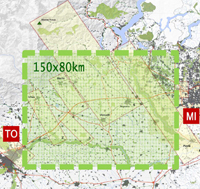ICTs: interfaces between people and places
Abstract
Although the spread of the smart city paradigm has been exponential, with a consequent decrease of part of its meaning, the smart city concept still suggests a system of innovative theories and practices. In this sense, the research “The smart region between Turin and Milan. Mobile services as drivers of spatial innovation towards Expo 2015” (Politecnico di Milano-Telecom Italia) is proposed as an opportunity for exploring the use of Information and Communication Technologies (ICTs) to promote an integrated system of services at the regional scale, also in perspective of the 2015 Universal Exhibition. Considering the transformation of universities into one of the major players in the current processes of urban and regional development, the research (in progress) has chosen to focus on the physical and immaterial services provided by university campuses. The operational phase of the research was developed in the second half of 2012, with a first focus on the Città Studi area in Milan, where the Sustainable Campus project (promoted by Politecnico and Università degli Studi di Milano) is going on. The outcome of the first implementation phase of the research has been the preliminary set up of two smartphone applications and the following development for the prototype of one of them. These APPs refer to some critical issues within the campus: the sharing of spaces for free study and work and the management of the demand and supply for the students housing. The project has also allowed to test a methodology with the aim of understanding the needs and of identifying the opportunities for the development of mobile services as interfaces between people and places in the campus and its urban context.
Downloads
References
Balducci A. (2005) “Dall'area metropolitana alla regione urbana: forme efficaci di pianificazione”, in Impresa & Stato n°71.
Balducci A., Cognetti F., Fedeli V. (2010) “Milano, la città degli studi. Storia, geografia e politiche delle università milanesi”, Associazione Interessi Metropolitani (AIM), Editrice Abitare Segesta, Milano.
Bassetti P. (2010) “L’Università tra globale e locale”, in Balducci A., Cognetti F., Fedeli V. (2010) “Milano, la città degli studi. Storia, geografia e politiche delle università milanesi”, Associazione Interessi Metropolitani (AIM), Editrice Abitare Segesta, Milano.
Bassetti P. (2012) “Milano glocal city”, in Camera di Commercio di Milano (2012) “Milano Produttiva. 22° Rapporto”, Mondadori, Milano.
Battisti E., Battisti F., Di Vita S., Guerritore C. (2011) “Expo Diffusa e Sostenibile”, Unicopli, Milano.
Di Vita S. (2011) “Milano-Torino 2015: proposte bottom up per una rigenerazione territoriale diffusa e sostenibile”, in De Magistris A., Rolando A. (2011), “Torino Milano: prospettive territoriali per una cooperazione competitiva”, Atti e Rassegna Tecnica, n. 3-4.
Emanuel C. (2011), “Il quadrante intermetropolitano del N-E Piemontese: le opportunità, le sfide e le strategie di un territorio in transizione”, in De Magistris A., Rolando A. (2011), “Torino Milano: prospettive territoriali per una cooperazione competitiva”, Atti e Rassegna Tecnica, n. 3-4.
Franz G. (2012) “Smart City vs Città Creativa. Una via italiana all’innovazione delle città”, Lulu Press.
Gottmann J. (1961) “Megalopolis. The urbanized Northeastern Seaboard of the United States”, Twentieth Century Fund, New York.
Granelli A. (2012) “Città intelligenti? Per una via italiana alle Smart Cities”, Luca Sassella Editore.
Hall P. et alii (2006) “The polycentric metropolis. Learning from mega-city regions in Europe”, Earthscan, Londra.
Martinotti G. (2010) “Come è cambiato il ruolo delle università: l’entrepreneurial università”, in Balducci A., Cognetti F., Fedeli V. (2010) “Milano, la città degli studi. Storia, geografia e politiche delle università milanesi”, Associazione Interessi Metropolitani (AIM), Editrice Abitare Segesta, Milano.
Perulli P., Pichierri A. (2010) “La crisi italiana nel mondo globale. Economia e società del Nord”, Einaudi, Torino.
Robertson R. (1992) “Globalization: social theory and global culture”, Sage Publication, Londra.
Rosina A. (2011) “Città protagoniste”, Le Scienze, numero speciale “Il futuro delle città”.
Scott A.J. (2001) “Global City-Regions. Trends, Theory, Policy”, Oxford University Press, Oxford.
The European House-Ambrosetti (2012) “Smart Cities in Italia: un’opportunità nello spirito del Rinascimento per una nuova qualità della vita”, http://www.ambrosetti.eu.

Copyright (c) 2014 Tema. Journal of Land Use, Mobility and Environment

This work is licensed under a Creative Commons Attribution 4.0 International License.
Authors who publish in this journal agree to the following:
1. Authors retain the rights to their work and give in to the journal the right of first publication of the work simultaneously licensed under a Creative Commons License - Attribution that allows others to share the work indicating the authorship and the initial publication in this journal.
2. Authors can adhere to other agreements of non-exclusive license for the distribution of the published version of the work (ex. To deposit it in an institutional repository or to publish it in a monography), provided to indicate that the document was first published in this journal.
3. Authors can distribute their work online (ex. In institutional repositories or in their website) prior to and during the submission process, as it can lead to productive exchanges and it can increase the quotations of the published work (See The Effect of Open Access)
